|
The Role of Astrology in King Lear
PERIOD 6
Text Four: “These late eclipses … portend no good to us” (Act 1, Scene 2, ll.102-180)
BEFORE READING ACTIVITIES
1) THE SUBPLOT SUMMARY (10 min. including oral check)
AIM: to focus on the subplot of the play, to engage students in a motivating activity using educational technologies. PROCEDURE: The activities of this period are to be run in a computer lab equipped with a sufficient number of computers (at least one every two students). The teacher gets the class to work in pairs and provides each pair with a copy of the text-file below. Once again, like the main plot summary, this is an information-gap exercise: the students are expected to complete the text by choosing the right word given in a box. What differs from the previous activity is that now students work on computers, and this may be more motivating than using traditional educational tools. Last but not least, computers allow tasks that are not performable otherwise, like the search mode applied on electronic texts. Before doing this activity, it may be useful to teach them the following terms:
To forge = to counterfeit; to make an imitation or copy in order to deceive people;
Jointly = held or done by two or more people together;
Revenues = income;
To disguise = to hide or cover up;
To flee = to run away, to escape;
To take over = to acquire or gain control of ;
To vow = to make a solemn promise;
To wound = to injure.
The following text is a summary of the subplot of King Lear. Choose the right word from the list below and complete the text.
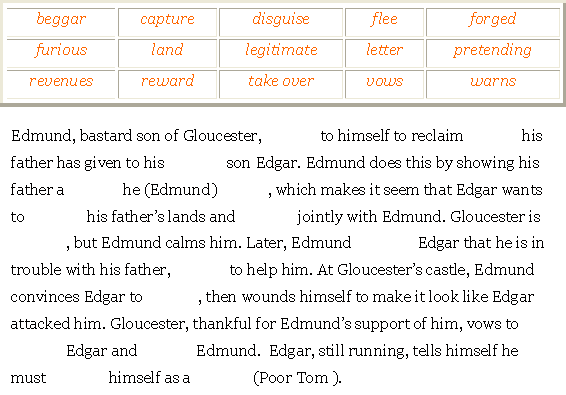
KEYS
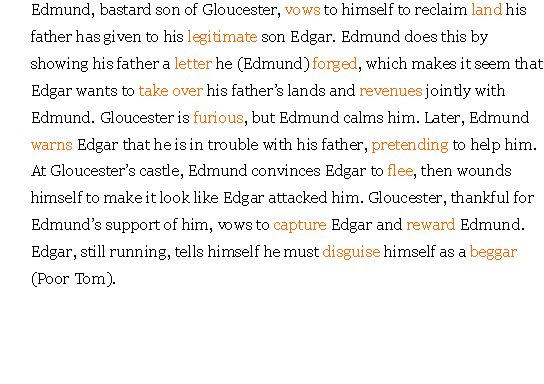
2) DO YOU BUSY YOURSELF WITH THAT?! (5 min.)
AIM: To introduce the role of astrology in King Lear, to create an expectation about what happens next. PROCEDURE: The teacher shows the image below with the over-head projector and prompts the students with questions like: “Do you busy yourself with that?” or “Do you believe the stars?” Some students may answer “Yes, I do” , some others “No, I don’t” or “I don’t believe that much”, but if we ask them if they believe the stars and planets determine our character, destiny and life expectancy, they might answer in the affirmative. Whatever the students think, this activity is only aimed at introducing the theme of astrology in King Lear , which is important, because by the difference between Gloucester’s and Edmund’s points of view towards astrology, we learn something about their approach to reality.
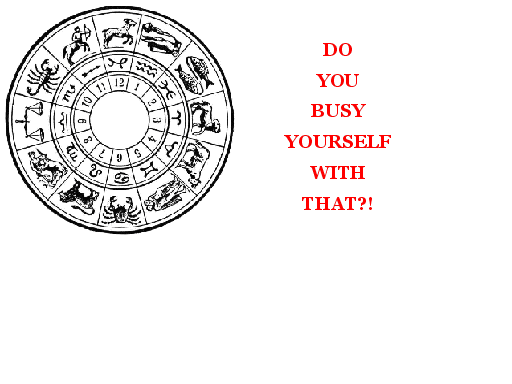
WHILE READING ACTIVITY
THE ROLE OF ASTROLOGY IN KING LEAR (25 min. including oral check)
AIM: To focus on Gloucester’s and Edmund’s attitudes towards astrology, to approach the role of astrology in the play, to engage students in a motivating activity, to teach them how to use the search feature for educational purposes. PROCEDURE: Students work in pairs. The teacher provides each pair a copy of the handout below, gives instructions about the task, and reminds the students that, in order to accomplish the last question, they have to use the search feature on an on-line version of the play (King Lear ). Students have fifteen minutes to answer the questionnaire and ten minutes to share their answers with their classmates. The teacher circulates, helping as required. Before doing the activity, it may be helpful to revise what happens before: “Alone on stage, Edmund offers his view of life. He refuses to submit to the patriarchal hierarchy we saw in operation in Act 1, Scene 1. Instead, he declares that nature is his goddess. He argues that he possesses personal qualities that make him his legitimate brother’s equal. Why should he be denied property and power because he is illegitimate? Edmund is determined to “grow” and “prosper”. Like Gonerill and Regan, he is ready to defend his own interests. He has written a letter which he intends to use to gain advantage over Edgar. At this point in the play he seeks to inherit his brother’s land.
Gloucester comes in muttering, disturbed by Lear’s rashness”.
Read the text and answer the following questions:
1.What is Gloucester’s attitude towards astrology?
2.What is Edmund’s attitude towards his father’s ideas?
3.How does Edmund call his father and what does he say about him?
4.Read the text below and underline (or make a list of) at least five words or phrases that refer to stars, planets or other heavenly bodies.
5.Go to King Lear’s text and find other references to three of these words or phrases in the play. Complete the following chart.
6.What is the role of astrology in the play?
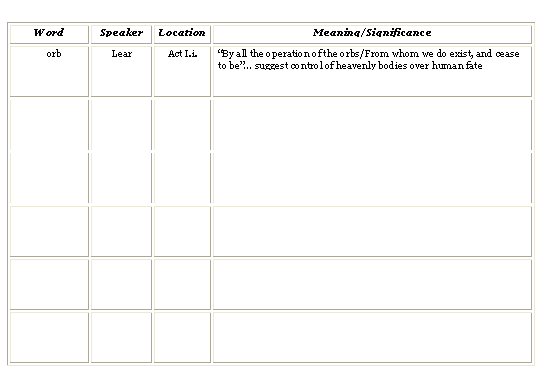
KEYS
1.Gloucester believes in astrology. He thinks that the eclipses, which result from natural causes, still have unnatural effects, causing the breakdown of human society.
2.Edmund doesn’t believe in astrology. He says he was born rough and self-centred, and that the stars had nothing to do with it.
3.He calls him a “whore-master”. He says that his father is responsible for his actions.
4.sun, moon, star, Dragon’s Tail, Ursa Major, firmament
5.Students read aloud their charts. Possible answers:
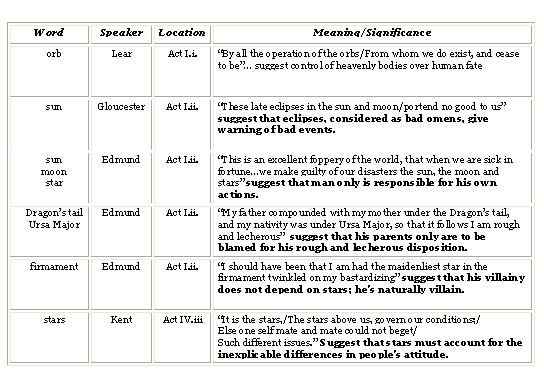
6.To show different approaches to reality. Lear and Gloucester share the same view of life: they believe they do not have control over their lives; for example they refuse their responsibilities as fathers (Lear also refuses the cares of state, but at the same time he doesn’t want to lose power). Kent’s position is quite similar, but different. Some Elizabethans believed that the stars affected nature as supernatural agents (Lear/Gloucester). Others believed that they were powerful natural forces (Kent). Edmund’s point of view is opposite: he holds man responsible for his own actions.
GLOUCESTER
These late eclipses in the sun and moon portend no good to
us. Though the wisdom of nature can reason it thus and thus , yet
nature finds itself scourged by the sequent effects. Love cools,
friendship falls off, brothers divide. In cities, mutinies ; in
countries, discord; in palaces, treason; and the bond cracked
'twixt son and father. This villain of mine comes under the
prediction; there's son against father: the King falls from bias
of nature; there's father against child. We have seen the best
of our time. Machinations, hollowness, treachery, and all
ruinous disorders follow us disquietly to our graves. Find out
this villain, Edmund; it shall lose thee nothing; do it
carefully. And the noble and true-hearted Kent banished! his
offence, honesty! 'Tis strange. Exit
EDMUND
This is the excellent foppery of the world, that, when we are
sick in fortune, often the surfeit of our own behaviour, we make
guilty of our disasters the sun, the moon, and the stars; as if
we were villains on necessity; fools by heavenly compulsion;
knaves, thieves, and treachers by spherical pre-dominance ;
drunkards, liars, and adulterers by an enforced obedience of
planetary influence; and all that we are evil in, by a divine
thrusting on . An admirable evasion of whore-master man , to lay
his goatish disposition to the charge of a star! My father
compounded with my mother under the Dragon's Tail, and my
nativity was under Ursa Major , so that it follows I am rough and
lecherous . Fut ! I should have been that I am, had the
maidenliest star in the firmament twinkled on my bastardizing.
(enter EDGAR)
pat ! he comes, like the catastrophe of the old comedy . My
cue is villainous melancholy, with a sigh like Tom o' Bedlam .
O, these eclipses do portend these divisions! Fa, sol, la, mi.
EDGAR How now, brother Edmund? What serious contemplation are you
in?
EDMUND I am thinking, brother, of a prediction I read this other day,
what should follow these eclipses.
EDGAR Do you busy yourself with that?
EDMUND I promise you, the effects he writes of succeed unhappily, as
of unnaturalness between the child and the parent, death,
dearth , dissolutions of ancient amities ; divisions in state,
menaces and maledictions against king and nobles, needless
diffidences, banishment of friends, dissipation of cohorts ,
nuptial breaches , and I know not what.
EDGAR How long have you been a sectary astronomical ?
EDMUND Come, come! When saw you my father last?
EDGAR The night gone by.
EDMUND Spake you with him?
EDGAR Ay, two hours together.
EDMUND Parted you in good terms? Found you no displeasure in him by
word or countenance ?
EDGAR None at all.
EDMUND Bethink yourself wherein you may have offended him, and at my
entreaty forbear his presence until some little time hath
qualified the heat of his displeasure, which at this instant so
rageth in him that with the mischief of your person it would
scarcely allay .
EDGAR Some villain hath done me wrong.
EDMUND That's my fear. I pray you have a continent forbearance till
the speed of his rage goes slower; and, as I say, retire with me
to my lodging, from whence I will fitly bring you to hear my
lord speak. Pray ye, go! There's my key. If you do stir abroad,
go armed.
EDGAR Armed, brother?
EDMUND Brother, I advise you to the best. Go armed. I am no honest man
if there be any good meaning toward you. I have told you what I
have seen and heard but faintly, nothing like the image and
horror of it. Pray you, away!
EDGAR Shall I hear from you anon ?
EDMUND I do serve you in this business.
Exit Edgar.
A credulous father! and a brother noble,
Whose nature is so far from doing harms
That he suspects none; on whose foolish honesty
My practices ride easy! I see the business.
Let me, if not by birth, have lands by wit;
All with me's meet that I can fashion fit .
Exit
AFTER READING ACTIVITY
SPOTLIGHT ON CHARACTERS (15 min. including oral check)
AIM: To focus on characters and characterisation. PROCEDURE: The teacher asks his/her students to work in pairs, and provides them with a copy of the handout below. After ten minutes he/she gets a class feedback.
Read the text and answer the following questions.
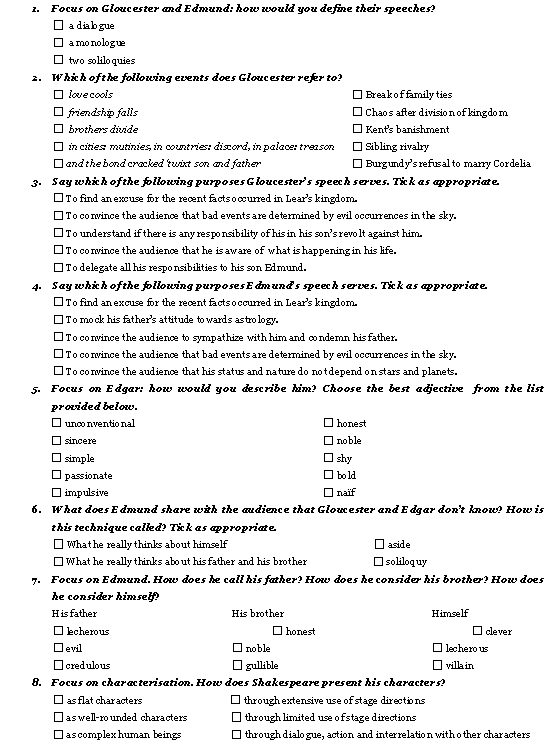
KEYS
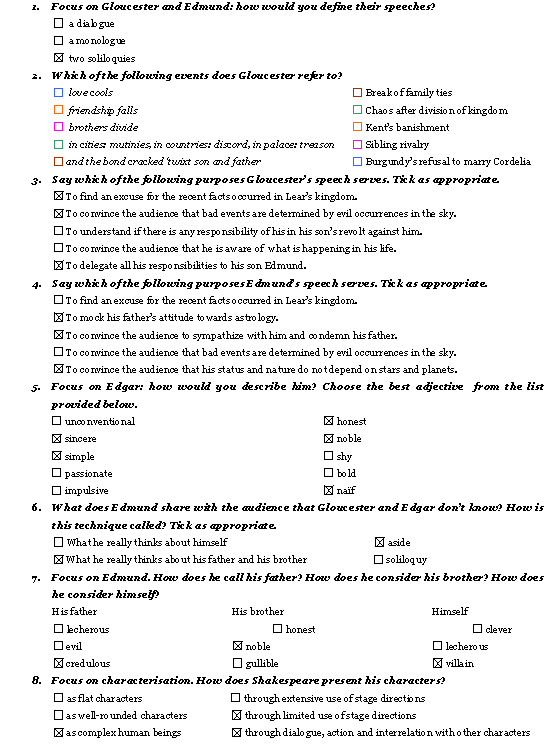
 6/11
6/11

|